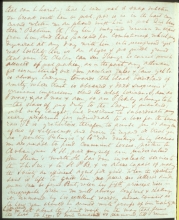Страница 14
that can be learnt; that he cares not a snap whether we break with him or not, nor is he in the least concerned whether we are pleased with him or not. Qui bono then? Between the (by him) imagined reverence we expect from him, and that uncalled for combativeness, which may degenerate at any day with him, into unexpressed yet real hostility, there is an abyss and no middle ground that even the Chohan can see. Though he cannot now be accused of not making, as in the past, any allowance for circumstances and our own peculiar rules and laws, yet he is always hurrying towards that black borderland of amity, where trust is obscured and dark suspicions and erroneous impressions cloud the whole horizon. I, am as I was; and, as I was and am, so am I likely always to be — the slave of my duty to the Lodge and mankind, not only taught, but desirous to subordinate every preference for individuals to a love for the human race. It is gratuitous, therefore, to accuse me or any one of us of selfishness, and desire to regard or treat you as "paltry Pelingis" and to "ride donkeys," only because we are unable to find convenient horses. Neither the Chohan, nor K.H., nor myself ever under valued Mr. Hume's worth. He has done invaluable service to the Th. Soc. and to H.P.B. and is alone capable of making the Society an efficient agent for good. When the spiritual soul is left to guide him, no purer, no better, nor kinder man can be found. But, when his fifth principle rises in irrepressible pride, we will always confront and challenge it. Unmoved by his excellent worldly counsel as to how you should be armed with proofs of our reality, or how you should set about the joint work in the way that seems the best to HIM, I will remain so unmoved, till I receive



qui bono is the Latin expression "cui bono," meaning "for whose benefit" or "to what purpose?"